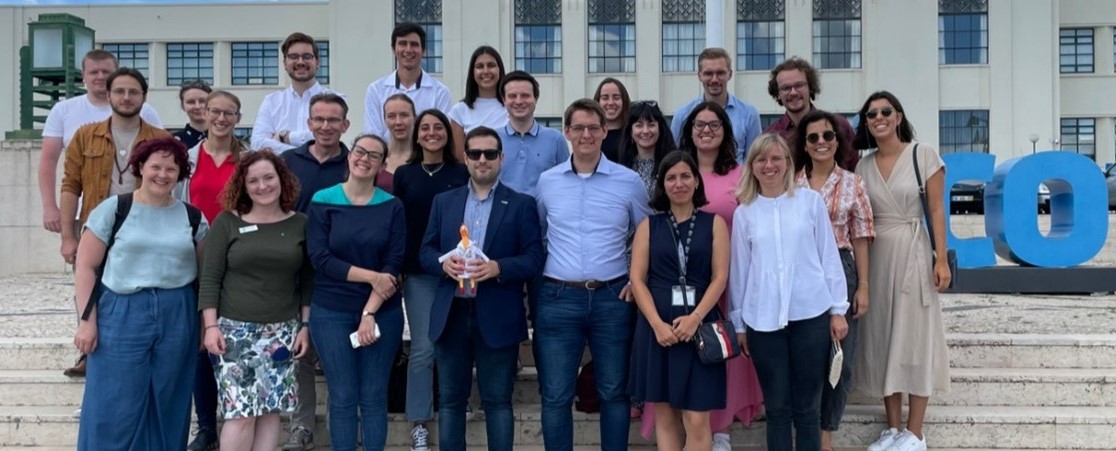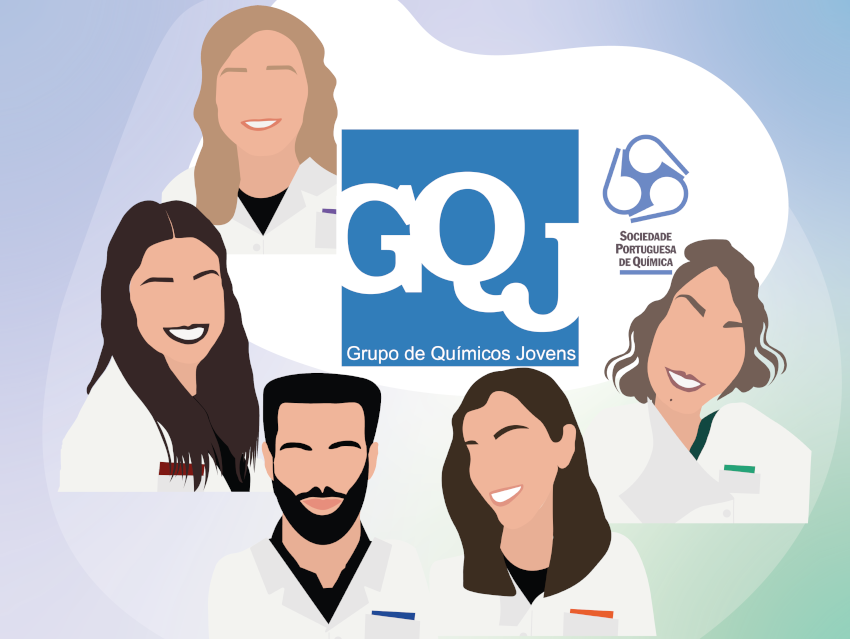1 Then and Now: The Founding of the Group and Its Goals Today
The Young Chemists Group (Grupo de Químicos Jovens, GQJ) of the Portuguese Chemical Society (Sociedade Portuguesa de Química, SPQ) was created on December 8, 2007, and has been led by a board of young Portuguese chemists that changes every two years (see Fig. 1). The main goal of the GQJ is to represent the community of Portuguese chemists under the age of 35, as well as to promote chemistry among young chemists, high school students, and the general public. The GQJ has around 400 members, accounting for 28 % of the total members of SPQ, which was founded on December 28, 1911.

Figure 1. Board members of the GQJ since 2008: The group has been led by seven different boards of young Portuguese chemists, changing every two years.
Today, the GQJ brings chemistry closer to society using several different activities and approaches:
- Promoting the interest in chemistry on social media channels: GQJ is currently active on YouTube, Twitter, Facebook, and Instagram.
- Launching digital contests that allow students of different ages to explore and develop their passion for chemistry.
- Visiting schools to foster the curiosity of younger students toward chemistry.
- Representing the Portuguese Chemical Society in international conferences and networks, i.e., within the European Young Chemists Network (EYCN) and the International Young Chemists Network (IYCN).
Since December 2021, the Board of the GQJ is composed of five different Ph.D. students, selected from different cities in Portugal to increase GQJ’s regional reach. The current Board Members are: Carolina Jesus from Universidade de Coimbra, Joana Madureira from Instituto Superior Técnico, Rui Sousa from Universidade do Minho, Rute Pereira from Universidade de Aveiro, and Vanessa Gomes from Universidade do Minho (see Fig. 2).

Figure 2. Illustration of the current board members of GQJ (2021-2023). © Rute A. Pereira
2 Activities Promoted by the GQJ
2.1 Portuguese Young Chemists Meeting (PYCheM)
The GQJ organizes a biennial conference (PYCheM) aimed at young chemists and taking place at different locations within Portugal. This meeting provides a pleasant and stimulating environment to allow young chemists to get to know each other’s work, discuss new ideas and collaborations, and connect with their peers, world-renowned scientists, and professionals in the field.
The beginning of PYCheM dates back to October 2008 in Lisbon. The biennial PYCheMs have included several plenary lectures by Nobel Laureates in chemistry, including Kurt Wüthrich (2002), Aaron Ciechanover (2004), Ada Yonath (2009), and Ei-ichi Negishi (2010). Furthermore, these meetings also feature keynote lectures by distinguished international scientists, as well as oral and poster presentations by young chemists, including Master’s students, Ph.D. students, and postdoctoral researchers.
These meetings, which have been gathering between 200 and 250 participants, provide a unique opportunity for young chemists to showcase their research and creativity, engage in scientific debates, network, make new contacts, and foster fruitful collaborations.
In 2023, the 8th PYCheM will take place in Vila Real on May 17–19. You can find more information on the event’s homepage.
2.2 Portuguese Young Chemists Award (PYCA)
The Portuguese Young Chemists Award (PYCA) is awarded every two years to young Ph.D. holders in chemistry (under 35 years old) and is presented at PYCheM. The award aims to reward the best Ph.D. thesis in any field of the chemical sciences and is open to both Portuguese and foreign young chemists who complete their Ph.D. degrees at a Portuguese university.
The prize aims to support outstanding research and excellence in chemistry among young chemists at the early stages of their careers, with an emphasis on scientific quality and impact, as well as the capacity to communicate the outcomes of their Ph.D. studies to society. The awardee is invited to deliver an oral presentation at PYCheM and write an article for SPQ’s magazine QUÍMICA. The awardee also receives a certificate of distinction and a monetary prize.
The next edition of PYCA will be announced at the beginning of 2023.
2.3 Science Outreach and Public Engagement Activities
Due to COVID-19 restrictions, public engagement activities had been suspended in the last two years. Fortunately, the GQJ is finally “on the road” again, and in 2023, school visits will be happening again, bringing together young chemists and students.
The GQJ board members will give talks at Portuguese high schools to raise public awareness of the key role and extraordinary impact of chemistry in our daily lives and the broad range of professional careers that people with a Chemistry background can pursue. The talks will also enable us to introduce GQJ activities, mainly those aimed at high school students, namely ChemRus.
2.4 ChemRus
Since 2012, the GQJ promotes chemistry among Portuguese high school students by running an annual competition entitled “ChemRus”. It intends to select and reward those high schools and students who make the best scientific videos based on their chemical knowledge. The winning students receive a different prize every year. You can find all the submitted videos on our YouTube channel.
In 2022, the latest edition of ChemRus, the students prepared scientific videos with experiments related to the chemistry of glass, as part of the celebration of the International Year of Glass.
The next edition in 2023 will be focused on “The Colors of Chemistry”.
2.5 FlashChem
The contest “FlashChem” is a photography contest that asks university students to bring their creativity to the maximum and tell their chemical story through a camera lens. The current edition is open for submission until November 18th, 2022, and is entitled “The Chemistry of Everyday life”.
2.6 YoungChem
YoungChem is the official magazine of the GQJ. Until this date, it has had two editions (2015 and 2016), but the third edition is being planned.
3 The GQJ Beyond Portugal
3.1 European Young Chemists’ Network (EYCN)
The GQJ represents Portuguese Young Chemists in all activities promoted by the EYCN. It takes part in the Delegates Assembly (EYCN DA), which is a meeting organized once a year. To date, the GQJ had the honor to organize three EYCN DAs in Portugal: Aveiro, May 2012, Guimarães, April 2016, and Lisbon, September 2022 (see Fig. 3).
 Figure 3. EYCN members at the Delegates Assembly in Lisbon, September 2022.
Figure 3. EYCN members at the Delegates Assembly in Lisbon, September 2022.
Additionally, the GQJ supports all EYCN activities and projects aimed at promoting chemistry in Europe and strengthening the collaboration and exchange of knowledge and experience among young chemists from different European countries. You can learn more about EYCN by visiting its website and following its social media channels.
3.2 International Young Chemists’ Network (IYCN)
The GQJ also represents Portuguese young chemists in activities promoted by the IYCN, a recently created International Network to connect young chemists around the globe. The GQJ and the IYCN work closely on these projects and the GQJ is proud to point out that João Borges, a previous member of GQJ’s board, is a past chair of the IYCN. You can learn more about the IYCN’s scope and how to become a member on its website—and do not forget to follow its social media channels to stay connected.
4 Summary
In summary, the activities promoted by the GQJ have significantly contributed to improved networking amongst young chemists.
For more information on the GQJ’s activities, please check out our website and reach out to us on our social media channels:
Facebook: www.facebook.com/gqj.spq
Instagram: www.instagram.com/gqj_spq
Twitter: www.twitter.com/gqjovens
YouTube: www.youtube.com/@gqj_spq
Author
Rute A. Pereira, is a Ph.D. Student at CICECO – Aveiro Institute of Materials, University of Aveiro, Portugal




